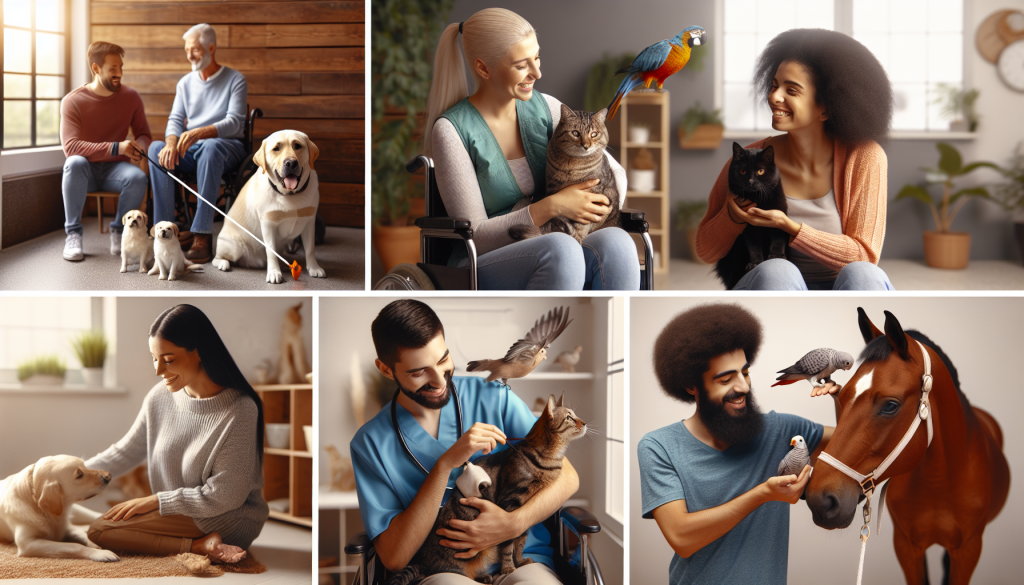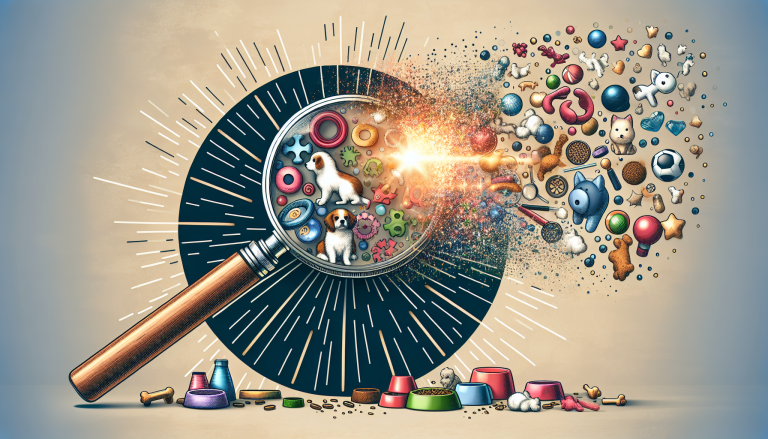Imagine having a furry companion that not only brings joy and happiness into your life but also supports you in your daily activities. In this article, we will explore the most popular pets for people with disabilities, shedding light on their amazing abilities and the unique ways they assist their owners. From guide dogs who provide independence for the visually impaired to therapy cats who offer comfort and emotional support, these incredible animals play a vital role in enhancing the lives of individuals with disabilities. Whether you’re looking for a loyal service animal or a loving companion, read on to discover the various options available and how they can positively impact your life.
Table of Contents
ToggleDogs
Dogs have long been known as loyal companions to humans, but they can also provide invaluable assistance to people with disabilities. There are various types of service dogs that are specifically trained to assist individuals with different needs. Whether it’s guiding individuals with visual impairments, alerting those with hearing impairments to important sounds, or providing physical support to individuals with mobility impairments, these highly trained service dogs can greatly enhance the lives of their owners.
Types of Service Dogs
There are several types of service dogs that are trained to perform specific tasks to assist individuals with disabilities. Guide dogs, also known as seeing-eye dogs, are trained to assist those with visual impairments or blindness by leading them around obstacles and navigating them safely. Hearing dogs are trained to alert individuals with hearing impairments to important sounds, such as doorbells, fire alarms, or approaching vehicles. Mobility assistance dogs are trained to provide physical support, retrieve objects, and perform tasks like opening doors for individuals with mobility impairments. Additionally, there are also medical alert dogs trained to detect and respond to medical emergencies such as seizures or diabetic episodes.
Training and Assistance Tasks
The process of training a service dog can be extensive and requires specialized knowledge and techniques. Service dogs go through rigorous training programs to ensure they can reliably perform their assistance tasks and behave appropriately in various environments. They are taught specific commands and trained to respond to cues from their handlers. Additionally, service dogs are trained to remain calm and focused even in stressful situations, making them reliable companions for individuals with disabilities.
The assistance tasks that service dogs can perform are numerous and depend on the specific needs of their handlers. These tasks may include guiding their handlers through crowds and busy streets, leading them to specific destinations, alerting them to sounds or dangers, picking up dropped objects, turning lights on and off, opening doors, providing stability while walking, and even fetching medication or a phone in case of an emergency. The tasks performed by service dogs greatly enhance the independence and quality of life for individuals with disabilities.
Benefits of Having a Service Dog
Having a service dog can bring numerous benefits to individuals with disabilities. Firstly, service dogs provide a sense of companionship and unconditional love, reducing feelings of isolation and loneliness. They become constant companions, offering emotional support and a sense of security to their owners. Service dogs also serve as a bridge to social interactions for their handlers, breaking down barriers and facilitating new connections with others.
In addition to the emotional benefits, service dogs can greatly enhance the independence and mobility of their handlers. They provide a greater sense of freedom by assisting with daily tasks and reducing reliance on others. Service dogs can also help individuals with disabilities gain confidence and improve their overall well-being. By performing a wide range of tasks and providing physical support, service dogs enable their owners to participate in activities they may have otherwise struggled with, such as going to public places, traveling, or even living alone.
Furthermore, service dogs have been found to have a positive impact on the mental health of their owners. Studies have shown that interacting and bonding with a service dog can reduce symptoms of depression, anxiety, and stress. The presence of a service dog can also help individuals manage their emotions effectively, providing a calming effect during moments of distress or anxiety. Overall, having a service dog can significantly improve the overall quality of life for individuals with disabilities.
Cats
While dogs are often the first animals that come to mind when thinking about service animals, cats also offer unique benefits to individuals with disabilities. Cats have been known to provide companionship, emotional support, and therapeutic effects to their owners. Their adaptability and independent nature make them suitable for various disabilities.
Benefits of Having a Cat
Having a cat as a pet can bring numerous benefits to individuals with disabilities. Cats are known for their calming presence and can offer emotional support to their owners. The gentle purring and rhythmic breathing of cats have a soothing effect, reducing stress and anxiety. The soft touch of a cat’s fur and the act of petting can release endorphins, which promote relaxation and a sense of well-being.
For individuals with physical disabilities, cats can provide companionship without requiring extensive physical activity. Unlike dogs, cats do not need to be walked or taken outside for bathroom breaks, making them a more manageable and low-maintenance option. This can be particularly beneficial for individuals with limited mobility or those who may have difficulty managing the care needs of a dog.
Adaptability for Different Disabilities
Cats are highly adaptable animals and can be well-suited for individuals with a wide range of disabilities. For individuals with visual impairments, cats can provide company and be a reliable source of comfort in their daily lives. Although cats may not guide their owners in the way that guide dogs do, they can still offer emotional support and become important companions.
Cats can also be beneficial for individuals with mental health conditions such as anxiety or depression. The presence of a cat can provide a sense of routine, responsibility, and purpose, which can be helpful in managing these conditions. Additionally, the act of caring for a cat and having a daily routine can provide structure and stability, reducing feelings of overwhelm or loneliness.
Therapeutic Effects
Cats have been found to have therapeutic effects on individuals with disabilities. Their presence can lower blood pressure, reduce heart rate, and decrease stress levels. The rhythmic purring of a cat has been shown to have a calming effect on the human nervous system, promoting relaxation and reducing anxiety.
Studies have also found that interaction with cats can increase levels of oxytocin, a hormone associated with bonding and feelings of well-being. This interaction can help individuals with disabilities build social connections and improve their overall mood. Furthermore, cats can provide a source of entertainment and playfulness, adding joy and laughter to their owners’ lives.
Birds
Birds have long been kept as pets for their beauty and melodious songs. However, they can also serve as excellent companions for individuals with disabilities. Their unique characteristics and ability to be trained make them suitable pets for various disabilities.
Types of Birds as Pets
There are several types of birds commonly kept as pets, such as parrots, cockatiels, canaries, and finches. The specific type of bird chosen as a pet will depend on the individual’s preferences and needs. Parrots are known for their ability to mimic human speech and form strong bonds with their owners. Cockatiels are highly sociable and affectionate birds, while canaries and finches are appreciated for their melodious songs.
Each type of bird has its own care requirements, so it is essential to research and understand the needs of the chosen bird species before bringing one into the home. Providing a proper diet, socialization, mental stimulation, and a suitable cage environment are crucial for the overall well-being of pet birds.
Benefits for Individuals with Disabilities
Birds can bring numerous benefits to individuals with disabilities. Their presence can provide companionship and emotional support, reducing feelings of loneliness and isolation. Birds are highly sociable creatures and enjoy spending time with their owners. The cheerful chirping and melodious songs of birds can create a soothing and tranquil environment, promoting a sense of calm and relaxation.
For individuals with communication difficulties, birds can serve as a means of non-verbal communication. Teaching birds to respond to cues and commands can enhance their owners’ sense of control and confidence. Additionally, birds can be a source of entertainment and joy, as their playful and curious nature can bring smiles and laughter to their owners’ faces.
Training and Interaction
Birds are highly intelligent animals and can be trained to perform tricks, interact with their owners, and even talk or mimic certain sounds. Training birds can provide mental stimulation and enrich their lives. Through positive reinforcement training methods, birds can learn to interact with their owners, respond to commands, and perform tricks.
Interacting and spending time with pet birds can also provide therapeutic effects. The act of watching birds fly, sing, and play can be a source of joy and relaxation. Additionally, birds’ vibrant colors and distinctive personalities can provide visual stimulation and enhance their owners’ overall well-being.
Fish
Fish are often considered one of the most low-maintenance pets, making them an excellent choice for individuals with disabilities. However, their benefits go beyond their easy care requirements. Owning fish can have a calming effect on individuals and provide therapeutic benefits.
Benefits of Owning Fish
One of the primary benefits of owning fish is their low maintenance. Compared to other pets, fish require minimal care. They do not need to be walked, groomed, or taken outside for bathroom breaks. Their basic needs include a suitable tank or aquarium, regular feeding, and occasional water changes. This low-maintenance aspect makes fish an ideal pet for individuals with physical disabilities or those who may have limited energy.
In addition to their low maintenance, fish can have a calming effect on individuals. Watching fish swim in an aquarium can be a form of visual relaxation. The rhythmic movement and graceful nature of fish can promote a sense of tranquility and reduce stress levels in their owners. This calming effect can be particularly beneficial for individuals with anxiety or sensory processing disorders.
Aquarium Therapy
The presence of an aquarium in the home can provide therapeutic benefits. Known as aquarium therapy or fish therapy, this practice involves observing fish and their underwater environment to promote relaxation and improve mental well-being. The tranquil and serene nature of an aquarium can help individuals reduce feelings of anxiety and induce a state of mindfulness. This therapy has been found to be especially effective in reducing stress levels and promoting a sense of calm.
Furthermore, studies have shown that watching fish in an aquarium can reduce blood pressure and heart rate, promoting a healthier physiological state. The vibrant colors and mesmerizing movements of fish can also provide visual stimulation, which can be particularly beneficial for individuals with sensory processing disorders. Overall, fish can bring both physical and mental health benefits to individuals with disabilities.
Rabbits
Rabbits are adorable and affectionate creatures that can make wonderful pets for individuals with disabilities. Their gentle nature and unique traits make them suitable companions, while their presence can provide emotional support and promote overall well-being.
Traits of Rabbits as Pets
Rabbits have several traits that make them ideal pets for individuals with disabilities. Firstly, they are generally calm and well-behaved, making them easier to handle and care for. Unlike dogs or cats, rabbits do not require frequent walks or outings, making them a more manageable option for individuals with limited mobility or energy.
Another unique trait of rabbits is their ability to form strong bonds with their owners. Rabbits can be affectionate and enjoy being petted and cuddled. Their soft fur and gentle nature can provide comfort and emotional support to individuals, reducing feelings of stress and anxiety.
Bonding and Emotional Support
Rabbits are highly social animals and thrive on companionship. They can develop deep bonds with their owners, providing a constant source of emotional support and companionship. Rabbits are known to be intuitive and can sense their owners’ emotions, offering comfort during difficult times.
For individuals with disabilities that may limit their social interactions, rabbits can be excellent companions. The presence of a rabbit can provide a sense of routine, responsibility, and purpose. Taking care of a rabbit’s basic needs, such as feeding, grooming, and providing a clean environment, can create a sense of structure and stability in an individual’s life.
Rabbit-Assisted Therapy
Rabbits have also been used in therapy programs to assist individuals with disabilities. Rabbit-assisted therapy involves interacting with rabbits in a structured and therapeutic environment to achieve specific therapeutic goals. This type of therapy can be beneficial for individuals with various disabilities, including autism spectrum disorders, anxiety, and depression.
Interacting with rabbits during therapy sessions can promote relaxation and reduce stress levels. The act of petting and cuddling a rabbit can release endorphins, which can improve mood and overall well-being. Additionally, rabbit-assisted therapy can help individuals develop important skills such as empathy, responsibility, and patience.
Guinea Pigs
Guinea pigs are small, gentle creatures that can make excellent pets for individuals with disabilities. Their sociable nature, ease of handling, and numerous benefits make them suitable companions for people with different needs.
Suitability for Different Disabilities
Guinea pigs can be suitable pets for individuals with various disabilities. Their small size and calm temperament make them easy to handle and care for. Unlike dogs or cats, guinea pigs do not require extensive training or physical activity, making them a more manageable option for individuals with limited mobility or energy.
Guinea pigs can also provide companionship and emotional support to individuals with disabilities. Their docile nature and ability to form strong bonds with their owners create a sense of connection and reduce feelings of isolation. Guinea pigs are known to recognize their owners’ voices and enjoy being petted and cuddled, providing comfort and affection.
Social Interaction and Companionship
Guinea pigs are highly social animals and enjoy the company of their owners. They can be gentle, friendly, and interactive pets, which can be particularly beneficial for individuals who may have limited social interactions. Guinea pigs provide a constant source of companionship and can help alleviate feelings of loneliness and boredom.
For individuals with communication difficulties, guinea pigs can serve as a means of non-verbal interaction. The act of caring for a guinea pig and bonding with them can enhance an individual’s confidence and sense of responsibility. Additionally, guinea pigs can be a source of entertainment and joy, as they are known to be playful and curious animals.
Benefits for Mental Health
The presence of guinea pigs can have several benefits for mental health. Interacting with guinea pigs has been found to reduce stress levels and promote relaxation. The soft fur and gentle purring of guinea pigs can create a calming effect, providing comfort during moments of anxiety or distress.
Studies have also shown that interacting with guinea pigs can lead to increased levels of oxytocin, a hormone associated with bonding and feelings of well-being. The tactile nature of petting and cuddling guinea pigs can release endorphins, which can elevate mood and reduce symptoms of depression.
Horses
Horses have been used for therapeutic purposes for centuries and are known for their powerful healing abilities. Equine-assisted therapy can benefit individuals with physical, emotional, and psychological disabilities. The unique bond that can be formed between humans and horses, coupled with the physical and emotional benefits of horse-related activities, make them invaluable in therapeutic settings.
Types of Equine-Assisted Therapy
Equine-assisted therapy encompasses a variety of activities and therapeutic interventions that involve horses. Therapeutic riding involves individuals with disabilities riding horses under the guidance of trained professionals. This can help improve balance, coordination, muscle strength, and overall physical fitness.
In addition to therapeutic riding, other interventions include equine-assisted psychotherapy, where horses are incorporated into the therapeutic process to address emotional and psychological issues. Equine-assisted learning focuses on experiential activities with horses that promote personal growth, social skills, and communication.
Physical and Psychological Benefits
Horse-related activities offer a range of physical and psychological benefits for individuals with disabilities. The rhythmic motion of riding a horse can improve muscle tone, coordination, and balance. These physical improvements can have a positive impact on individuals with conditions such as cerebral palsy, multiple sclerosis, or spinal cord injuries.
The bond formed between humans and horses can also have profound psychological effects. Interacting with horses can reduce stress levels, promote relaxation, and boost self-esteem. Horses are known to be non-judgmental and intuitive animals, providing a safe and non-threatening environment for individuals to explore emotions and build trust.
Rehabilitation and Therapeutic Riding
Horses play a crucial role in rehabilitation and therapeutic riding programs. Therapeutic riding can help individuals regain physical strength and mobility, as well as improve cognitive and sensory processing skills. By engaging in horse-related activities, individuals can enhance their overall well-being and quality of life.
Rehabilitation with horses offers a unique form of physical therapy that combines the benefits of horse riding with core strengthening exercises. The movement of the horse stimulates the muscles, joints, and balance mechanisms in the rider’s body, promoting postural control and coordination. Therapeutic riding also provides individuals with a sense of accomplishment and empowerment as they learn to control and interact with such a large and powerful animal.
Assistance Monkeys
While less common than other assistance animals, assistance monkeys can be highly trained to perform a variety of tasks to assist individuals with disabilities. Their intelligence, dexterity, and ability to learn complex tasks make them well-suited for specific assistance roles.
Types of Monkeys as Assistive Pets
There are several species of monkeys that are commonly trained as assistance animals, such as capuchins and squirrel monkeys. These monkeys are chosen for their intelligence, agility, and ability to perform intricate tasks. They undergo extensive training to learn a wide range of assistance tasks tailored to the specific needs of their handlers.
Monkeys trained as assistive pets can perform tasks such as retrieving items, opening doors or cabinets, turning light switches on and off, operating simple household appliances, and even assisting with dressing or personal care. Their small size and dexterous hands make them particularly useful in tasks that require fine motor skills.
Training Benefits and Tasks
The training process for assistance monkeys involves positive reinforcement techniques and extensive socialization. Monkeys are taught to understand verbal commands and respond to cues from their handlers. They also learn to perform tasks independently and adapt to different environments and situations.
The tasks performed by assistance monkeys can greatly enhance the independence and quality of life for individuals with disabilities. From fetching necessary items to assisting with daily living activities, these highly trained monkeys provide invaluable support to their handlers. They can even help with mobility by providing stability and balance support when walking or climbing.
Independence and Increased Mobility
Having an assistance monkey can greatly increase an individual’s independence and mobility. These intelligent animals can be trained to perform tasks that reduce reliance on others and enhance overall self-sufficiency. Assistance monkeys can help individuals with disabilities maintain their own homes, navigate public spaces, and participate in daily activities with greater ease and confidence.
The presence of an assistance monkey can also contribute to a sense of emotional well-being and companionship. These animals become trusted companions and provide constant support and companionship to their handlers. Assistance monkeys also serve as a bridge to social interactions, fostering connections with others and breaking down barriers.
Miniature Horses
Miniature horses may seem an unconventional choice for assistance animals, but they offer unique benefits for individuals with disabilities. Their small size, adaptability, and calm nature make them well-suited for different types of disabilities.
Benefits of Miniature Horses as Assistance Animals
Miniature horses have several qualities that make them suitable assistance animals. Their small size, typically ranging from 24 to 34 inches in height, allows them to be easily handled and transported. This makes them a practical option for individuals with physical disabilities or those who may have limited space.
Miniature horses also possess a calm and gentle nature, which is essential for working closely with individuals with disabilities. They are known for their steady temperament and patience, making them reliable companions and supporters. Additionally, their lifespan of up to 30 years allows for long-term partnerships and stability for individuals who rely on their assistance.
Training Requirements and Tasks
Miniature horses undergo extensive training to become certified assistance animals. They are taught a wide range of tasks specific to the needs of their handlers. These tasks may include guiding individuals with visual impairments, providing stability and balance support, retrieving objects, and even pulling wheelchairs or carts.
The training process for miniature horses is similar to that of other service animals, emphasizing positive reinforcement techniques and socialization. Miniature horses learn to respond to verbal and physical cues, behave appropriately in various environments, and remain calm and focused during their work. The specialized training ensures that miniature horses can reliably perform their assistance tasks and behave appropriately in different situations.
Suitability for Various Disabilities
Miniature horses can benefit individuals with a wide range of disabilities. For individuals with visual impairments, miniature horses can serve as reliable guides, navigating their handlers safely through crowds and obstacles. Their ability to recognize potential dangers and respond accordingly ensures the safety of their owners.
Miniature horses can also assist individuals with mobility impairments, providing support and stability while walking or standing. The strength and balance of miniature horses make them ideal for individuals who may struggle with walking independently or have limited mobility.
Furthermore, miniature horses can provide emotional support and a sense of companionship to individuals with disabilities. Their presence can reduce feelings of isolation and loneliness, offering constant support and connection. Miniature horses also serve as a bridge to social interactions, breaking down barriers and fostering connections with others.
Pot-bellied Pigs
Pot-bellied pigs may not be the first animals that come to mind when thinking about assistance animals, but they offer unique traits and benefits for individuals with disabilities. Their intelligence, emotional support, and trainability make them valuable companions and assistance animals.
Traits and Benefits of Having a Pot-bellied Pig
Pot-bellied pigs have several traits that make them suitable pets and assistance animals. They are highly intelligent animals and can be easily trained to perform specific tasks. Pot-bellied pigs are also known for their affectionate and loving nature, forming strong bonds with their owners.
One of the primary benefits of having a pot-bellied pig as an assistance animal is their emotional support. They provide constant companionship and understanding to their owners, reducing feelings of loneliness and isolation. Pot-bellied pigs are sensitive to their owners’ emotions and can offer comfort during difficult times.
Intellect and Emotional Support
Pot-bellied pigs are highly intelligent animals, often compared to the intelligence of dogs. They can be easily trained to perform a variety of tasks, making them valuable assistance animals. These tasks may include retrieving items, bracing for stability, opening doors or cabinets, or even providing physical therapy assistance.
The emotional support provided by pot-bellied pigs is also significant. They have a calming and nurturing presence, reducing stress and anxiety in their owners. Pot-bellied pigs are known to sense their owners’ emotions and respond with affection and understanding.
Training and Adaptability
Training pot-bellied pigs as assistance animals requires time, patience, and consistency. They can learn specific tasks and commands through positive reinforcement training methods. The training process focuses on strengthening the bond between the pig and their owner while teaching the pig to respond to cues and perform tasks reliably.
Pot-bellied pigs’ adaptability makes them suitable for individuals with different disabilities. Their size, typically ranging from 100 to 200 pounds, allows for easy handling and makes them generally more manageable than larger pig breeds. Pot-bellied pigs can adapt to various living environments, including apartments or smaller homes, making them accessible companions for individuals with limited space.
In conclusion, various animals can bring incredible benefits to individuals with disabilities. Dogs, cats, birds, fish, rabbits, guinea pigs, horses, assistance monkeys, miniature horses, and pot-bellied pigs all offer unique qualities that enhance the lives of their owners. From providing companionship and emotional support to assisting with daily tasks and promoting physical and mental well-being, these animals serve as invaluable companions and assistance animals. The choice of an assistance animal ultimately depends on an individual’s needs, preferences, and the specific benefits they seek. Whether it be a service dog providing physical support and independence or a pot-bellied pig offering emotional support and companionship, the bond between humans and animals can be truly transformative for individuals with disabilities.








